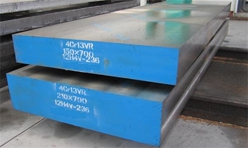1.2083, S136, X40Cr14, Stainless Tool Steel
1.2083 Introduction
1.2083 Stainless Tool Steel is a martensitic stainless steel with 12% Chromium which is sufficient to give good corrosive resistance properties. It’s best corrosive resistance is when hardened and surface is ground or polished.It has good ductility in the annealed condition but can be hardened up to 500HB (highest of the chromium grades). Martensitic Grades are known for high hardness and allowances must be
made for poor weldability and usually allowances for a final harden and temper treatment. Steel is magnetic and welding is not recommended.
S136 Stainless Mirror Plastic Mold Steel
Excellent Corrosion Resistance
S136 resists water, steam, weak organic acids, diluted nitrates, carbonates, etc. Molds made from this material will not rust or become contaminated when operated in humid environments or when used with corrosive plastic materials under normal conditions. S136 exhibits particularly excellent corrosion resistance when tempered at low temperatures and polished to a mirror finish.
Superior Polishability
Quenched and tempered S136 possesses excellent polishing properties. However, its polishing technique differs slightly from other steels. The main principle is to use multiple steps during fine grinding and polishing, avoiding polishing on very rough surfaces. During polishing, the process should be stopped immediately once scratch marks from the previous polishing step are removed.
We can provide more services:
1、Hardening and tempering
2、Vacuum heat treatment
3、Polished bright surface
4、Milling bright surface
5、CNC machine
6、Deep drilling
7、Cut into small pieces
8、Make it closer to the mold
Welcome to inquiry price from drawing
Cutting:
Precision cutting to standard dimensions
Custom cutting according to client specifications
Surface Grinding/Polishing:
Thickness tolerance: -0 to +0.1mm
Flatness: 0.01/100mm
Surface roughness: Ra ≤1.6 or Rz ≤6.3
1.2083 Applications
Moulds for corrosive plastic materials such as PVC, recycled polymers etc., moulds for chemically aggressive plastics and plastics containing abrasive fillers, mould inserts, dies and gauges for PVC extrusions, screws and barrels for extruders, moulds for automotive, food, medical and optical industry such as spectacles, compact discs, lenses.
Quality Standard
All Grades Comparison
| ASTM A176 | Werkstoff | ASSAB | JIS |
|---|---|---|---|
| 420 | 1.2083 | S136 | SUS 420J2 |
Smelting Option
1 EAF: Electric Arc Furnace
2 EAF+LF+VD: Refined-smelting and vacuum degassing
3 EAF+ESR: Electro Slag Remelting
4 EAF+PESR: protective atmosphere Electro Slag Remelting
5 VIM+PESR: Vacuum induction melting
Forming Option
1 Hot rolling process
2 Hot Forging: Electro-hydraulic; High-speed-hydraulic; Oil-hydraulic; Precision-forging
Heat-treatment Option
1 +A: Annealed (full/soft/spheroidizing)
2 +N: Normalized
3 +NT: Normalized and tempered
4 +QT: Quenched and tempered (water/oil)
5 +AT: Solution annealed
6 +P: Precipitation hardened
Suface Option
1 Black Surface
2 Grounded: Bright but rough ; Not precision
3 Machining for plate: Bright and precision; Little turning scar
4 Peeled/Turned: Bright and precision; Little turning scar
5 Polished: Very Bright and precision size; Not turning scar
Other Services
1 Cutting: Small pieces
2 CNC Machine: Produce as your drawing
3 Package: Bare/Nylon/Canvas/Wooden
4 Payment:T/T, L/C, O/A(request credit)
5 Transport:FOB/CFR/CIF/DDU/DDP (train/ship/Air)
5 1.2083 Chemical Composition(%)
| C | Si | Mn | P | S | Cr | Ni | Mo |
|---|---|---|---|---|---|---|---|
| 0.15 min | 1.0 max | 1.0 max | 0.040 max | 0.030 max | 12.0-14.0 | 0.75 max | 0.50 max |
6 Mechanical Properties (Q+T)
| Tensile Strength (Mpa) | Yield Strength (Mpa) | Elongation (%) | Hardness (HB) |
|---|---|---|---|
| 850-1000 | 600 min | 12 min | 280 min |
7 HEAT TREATMENT
Forging: P20 plastic mould steel are forged at 1093°C (2000°F) down to 899°C (1650°F). Forging below 871°C (1600°F) is not recommended for these steels.
Annealing: For maximum softness, heat uniformly to 1500 – 1650°F (816 – 899°C) and cool slowly in the furnace.
Stress Relieving: Heat at 300 – 800°F (149 – 427°C) for 1 to 3 hours, cool in air
or quench in oil or water.
Hardening: Preheat, then heat to 1800 -1950°F (982 – 1066°C), soak at temperature
and air cool or quench in warm oil.
Welding: The martensitic class of stainless steels has limited weldability due to its
hardenability. Special consideration is required to avoid cold cracking by preheating to 550°F (260°C). Post-weld heat treatment should be considered to achieve required properties. This particular alloy is generally considered to have poorer weldability than the most common alloy of this stainless class, Type
410. A major difference is higher carbon content for this alloy which requires both preheat and post-weld heat treatment. When a weld filler is needed, AWS E/ER 420, 410 NiMo and 309L are most often specified. Type 420 is well known in reference literature and more information can be obtained in this way.
Forming: If annealed for maximum softness, Type 420 can be moderately drawn and
formed.
8 Mill′s test certificate
EN 10204/3.1 with all relevant data reg. chem. composition, mech. properties and results of testing.

